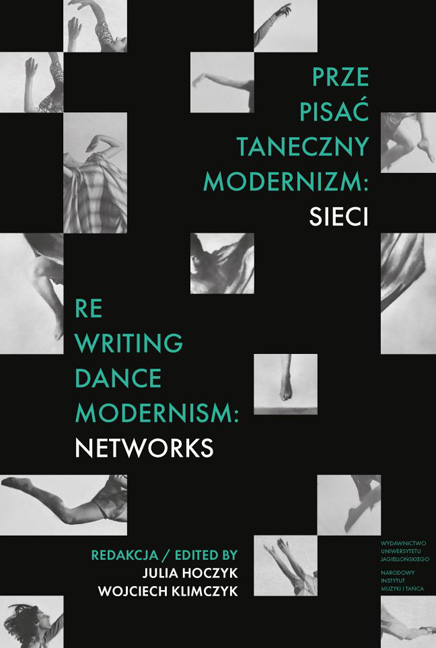Book contents
- Frontmatter
- Contents
- Prze-pisać taneczny modernizm: sieci
- Metodologie: usieciowianie tanecznego modernizmu
- Transmisje: transnarodowe trajektorie tanecznego modernizmu
- Poszerzenia: taneczny modernizm w słowiańskiej Europie Środkowej
- Methodologies: Networking Dance Modernism
- Transmissions: Transnational Trajectories of Dance Modernism
- Expansions: Dance Modernism in Slavic Central Europe
- Biogramy autorów
- Authors’ Biographies
- Indeks / Index
- Miscellaneous Endmatter
- Miscellaneous Endmatter
Re-writing Dance Modernism: Networks
Published online by Cambridge University Press: 01 March 2024
- Frontmatter
- Contents
- Prze-pisać taneczny modernizm: sieci
- Metodologie: usieciowianie tanecznego modernizmu
- Transmisje: transnarodowe trajektorie tanecznego modernizmu
- Poszerzenia: taneczny modernizm w słowiańskiej Europie Środkowej
- Methodologies: Networking Dance Modernism
- Transmissions: Transnational Trajectories of Dance Modernism
- Expansions: Dance Modernism in Slavic Central Europe
- Biogramy autorów
- Authors’ Biographies
- Indeks / Index
- Miscellaneous Endmatter
- Miscellaneous Endmatter
Summary
This book germinated from a meeting. In December 2016, Łódź hosted the international conference How Does the Body Think? Corporeal and Movement Based Practices of the Modernism Era. Accompanied by the exhibition Moved Bodies: Choreographies of Modernity, which showcased contemporary dance projects inspired by modernism, the event attracted researchers representing several different countries and generations. Among others, the list of participants included the authors of studies featured in this collection: Susan Manning and myself. We were both surprised and delighted to discover that although we lived far apart, our roots were common in a geographical sense. Although she was born in the United States, Manning's family originated from the Opole region, where I was born and raised. This would not be worth mentioning had it not been for the fact that one of the conference themes, addressed in Manning's paper, concerned the interlinks between the history of dance and geography which she considered in a contribution subsequently published under the title Nation and World in Modern Dance, featured in the edited collection Moved Bodies. Choreographies of Modernity. In her paper (and in her conversations with me), Manning emphasized the problematic nature of interpreting the history of modern dance through the national lens, which introduces contrived differences between respective dance traditions (both in terms of dance practices and historical narratives), and leads to the hegemony of the strongest ones (i.e., American and German) coupled with the marginalization of others. Following this pattern, one would expect that scholars educated in different academic systems would likewise write histories expressive of the spirit of their respective nations. Our encounter demonstrated that the situation is in fact much more complicated, and that the relation between geography and history in the context of dance studies calls for a more thorough rethinking.
The nationalization of the history of dance modernism, from the pioneering practices of Loie Fuller and Isadora Duncan to the projects conceived by the contemporaries of Merce Cunningham and Alwin Nikolais, artificially unified the character of all sorts of dance practices that have since been habitually referred to by the ambiguous umbrella term of “dance modernism,” expressive of American or German cultural identity.
- Type
- Chapter
- Information
- Re-writing Dance Modernism: Networks , pp. 297 - 318Publisher: Jagiellonian University PressPrint publication year: 2023



